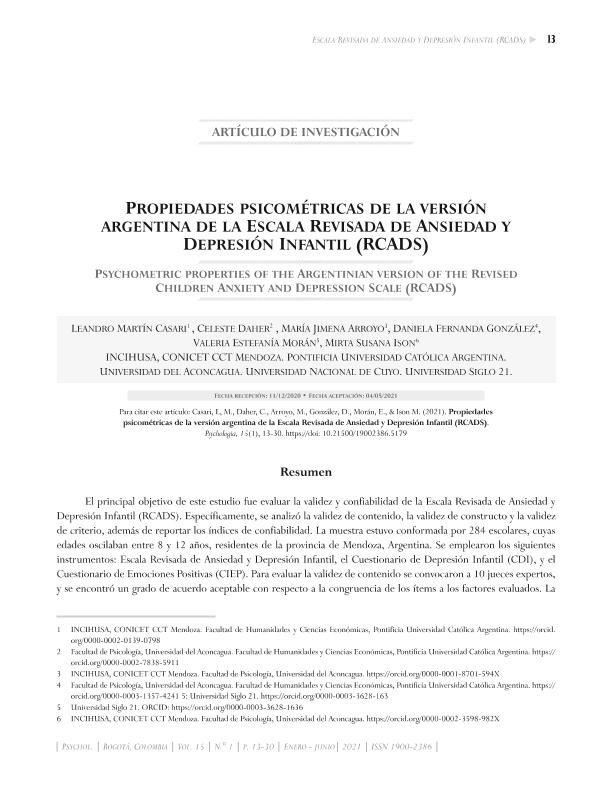Mostrar el registro sencillo del ítem
dc.contributor.author
Casari, Leandro Martín

dc.contributor.author
Daher, Celeste

dc.contributor.author
Arroyo, María Jimena

dc.contributor.author
González, Daniela Fernanda
dc.contributor.author
Morán, Valeria Estefanía
dc.contributor.author
Ison, Mirta Susana

dc.date.available
2022-09-07T18:43:28Z
dc.date.issued
2021-12
dc.identifier.citation
Casari, Leandro Martín; Daher, Celeste; Arroyo, María Jimena; González, Daniela Fernanda; Morán, Valeria Estefanía; et al.; Propiedades psicométricas de la versión argentina de la escala revisada de ansiedad y depresión infantil (RCADS); Universidad de San Buenaventura; Psychologia; 15; 1; 12-2021; 13-30
dc.identifier.issn
1900-2386
dc.identifier.uri
http://hdl.handle.net/11336/167810
dc.description.abstract
El principal objetivo de este estudio fue evaluar la validez y confiabilidad de la Escala Revisada de Ansiedad y Depresión Infantil (RCADS). Específicamente, se analizó la validez de contenido, la validez de constructo y la validez de criterio, además de reportar los índices de confiabilidad. La muestra estuvo conformada por 284 escolares, cuyas edades oscilaban entre 8 y 12 años, residentes de la provincia de Mendoza, Argentina. Se emplearon los siguientes instrumentos: Escala Revisada de Ansiedad y Depresión Infantil, el Cuestionario de Depresión Infantil (CDI), y el Cuestionario de Emociones Positivas (CIEP). Para evaluar la validez de contenido se convocaron a 10 jueces expertos, y se encontró un grado de acuerdo aceptable con respecto a la congruencia de los ítems a los factores evaluados. La validez de constructo fue evaluada comparando modelos alternativos de la RCADS, encontrando índices de ajuste adecuados para un modelo de cinco factores y 25 ítems, así como índices aceptables de confiablidad.Por último, se encon-traron correlaciones significativas positivas entre las dimensiones del RCADS con el CDI y correlaciones significativas negativas con los factores del CIEP. Se discuten los resultados en función de los antecedentes, y se señalan limitaciones de la presente investigación.
dc.description.abstract
The main objective of this study was to evaluate the validity and reliability of the Revised Child Anxiety and Depression Scale (RCADS). Specifically, content validity, construct validity and criterion validity were assessed, in addition to reporting the reliability index. The sample was composed of 284 schoolchildren whose ages ranged from 8 to 12 years. All of them were from the state of Mendoza, Argentina. The following instruments were used: Revised Child Anxiety and Depression Scale, the Child Depression Questionnaire (CDI), and the Positive Emotions Questionnaire (CIEP). To evaluate content validity, 10 expert judges were summoned, and an acceptable degree of agreement was found regarding the congruence of the items to the evaluated factors. The construct validity was evaluated by comparing alternative models of the RCADS, finding adequate fit indices for a model of five factors and 25 items, as well as an acceptable index of reliability. Finally, significant positive correlations were found between the dimensions of the RCADS with the CDI and significant negative correlations with the factors of the CIEP. The results are discussed based on the previous research, and the weakness of this research are pointed out.
dc.format
application/pdf
dc.language.iso
spa
dc.publisher
Universidad de San Buenaventura
dc.rights
info:eu-repo/semantics/openAccess
dc.rights.uri
https://creativecommons.org/licenses/by-nc-sa/2.5/ar/
dc.subject
ANSIEDAD
dc.subject
DEPRESIÓN
dc.subject
EVALUACIÓN
dc.subject
INFANCIA
dc.subject
PSICOMETRÍA
dc.subject.classification
Otras Psicología

dc.subject.classification
Psicología

dc.subject.classification
CIENCIAS SOCIALES

dc.title
Propiedades psicométricas de la versión argentina de la escala revisada de ansiedad y depresión infantil (RCADS)
dc.title
Psychometric properties of the Argentinian version of the Revised Children Anxiety and Depression Scale (RCADS)
dc.type
info:eu-repo/semantics/article
dc.type
info:ar-repo/semantics/artículo
dc.type
info:eu-repo/semantics/publishedVersion
dc.date.updated
2022-09-06T17:52:39Z
dc.identifier.eissn
2665-4202
dc.journal.volume
15
dc.journal.number
1
dc.journal.pagination
13-30
dc.journal.pais
Colombia

dc.journal.ciudad
Bogotá
dc.description.fil
Fil: Casari, Leandro Martín. Consejo Nacional de Investigaciones Científicas y Técnicas. Centro Científico Tecnológico Conicet - Mendoza. Instituto de Ciencias Humanas, Sociales y Ambientales; Argentina
dc.description.fil
Fil: Daher, Celeste. Universidad del Aconcagua. Facultad de Psicología; Argentina. Consejo Nacional de Investigaciones Científicas y Técnicas. Centro Científico Tecnológico Conicet - Mendoza. Instituto de Ciencias Humanas, Sociales y Ambientales; Argentina
dc.description.fil
Fil: Arroyo, María Jimena. Consejo Nacional de Investigaciones Científicas y Técnicas. Centro Científico Tecnológico Conicet - Mendoza. Instituto de Ciencias Humanas, Sociales y Ambientales; Argentina
dc.description.fil
Fil: González, Daniela Fernanda. Universidad del Aconcagua. Facultad de Psicología; Argentina
dc.description.fil
Fil: Morán, Valeria Estefanía. Universidad Empresarial Siglo XXI; Argentina
dc.description.fil
Fil: Ison, Mirta Susana. Consejo Nacional de Investigaciones Científicas y Técnicas. Centro Científico Tecnológico Conicet - Mendoza. Instituto de Ciencias Humanas, Sociales y Ambientales; Argentina
dc.journal.title
Psychologia
dc.relation.alternativeid
info:eu-repo/semantics/altIdentifier/url/https://www.revistas.usb.edu.co/index.php/Psychologia/article/view/5179
dc.relation.alternativeid
info:eu-repo/semantics/altIdentifier/doi/http://dx.doi.org/10.21500/19002386.5179
Archivos asociados
